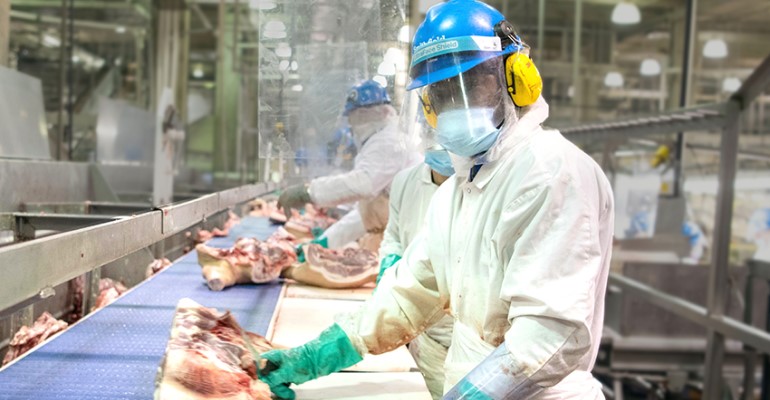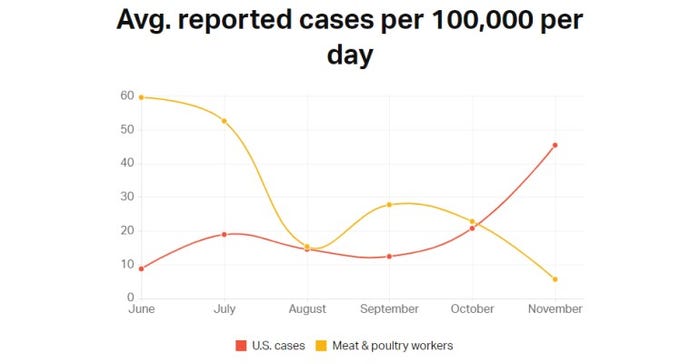
The U.S. House of Representatives Select Subcommittee on the Coronavirus Crisis launched an investigation Monday of coronavirus outbreaks at meatpacking plants nationwide, which have resulted in the deaths of more than 250 employees. Subcommittee Chairman Rep. James Clyburn, D-S.C., sent letters to the Occupational Safety and Health Administration as well as to Tyson Foods, Smithfield Foods and JBS USA.
"Public reports indicate that under the Trump Administration, the Occupational Safety and Health Administration failed to adequately carry out its responsibility for enforcing worker safety laws at meatpacking plants across the country, resulting in preventable infections and deaths,” Clyburn wrote to OSHA. “It is imperative that the previous Administration’s shortcomings are swiftly identified and rectified to save lives in the months before coronavirus vaccinations are available for all Americans.”
The Select Subcommittee’s investigation follows reports that nearly 54,000 workers at 569 meatpacking plants in the United States have tested positive for the coronavirus, and at least 270 have died. The Centers for Disease Control and Prevention (CDC) has identified meatpacking plants as a source for “rapid transmission” of the coronavirus. More than two-thirds of employees at meatpacking plants are Black or Hispanic, and almost half of employees live in low-income families.
Under the Trump Administration, OSHA issued only eight citations and less than $80,000 in total penalties for coronavirus-related violations at meatpacking companies—which Clyburn says is “a paltry amount that has failed to curb dangerous conditions faced by many workers.” For example, OSHA found that 1,294 workers at a Sioux Falls, South Dakota plant contracted the coronavirus, and four died. Yet the agency fined the plant’s owner, Smithfield Foods, only $13,494—less than $11 per employee infected with the virus. Smithfield paid its chief executive officer $14 million in 2019, a statement from Clyburn says.
In the last year, "OSHA failed to issue enforceable rules, respond in a timely manner to complaints, and issue meaningful fines when a company’s unsafe practices led to the deaths of employees,” the Chairman continued. “As a result, I am concerned that under the Trump Administration, OSHA did not fulfill its mission to protect vulnerable meatpacking workers during the pandemic.”
Clyburn also sent letters to three meatpacking companies, which have had a combined total of at least 41 major outbreaks in meatpacking facilities in 20 states, including multiple outbreaks in the same facilities.
JBS USA, the world’s largest meatpacker, has had at least 3,000 employees contract the coronavirus and 18 of these employees died.
Tyson Foods has seen more than 12,000 workers contract the coronavirus and 38 die from it. Managers at one Tyson plant allegedly ordered workers to stay on the job and then placed bets on how many would contract the virus.
Smithfield Foods, whose parent company reported $925 million in profit in the first half of 2020, has had more than 3,500 workers contract the coronavirus and eight employees die.
Clyburn wrote to these companies: “Public reports indicate that meatpacking companies … have refused to take basic precautions to protect their workers, many of whom earn extremely low wages and lack adequate paid leave and have shown a callous disregard for workers’ health. These actions appear to have resulted in thousands of meatpacking workers getting infected with the virus and hundreds dying. Outbreaks at meatpacking plants have also spread to surrounding communities, killing many more Americans.”
However, the North American Meat Institute defended the actions of its members.
“Public health guidance has varied widely around the world and across the United States throughout the pandemic, but more than $1.5 billion in comprehensive protections instituted since the spring successfully cut average case rates for meat and poultry workers five times lower in December 2020 than they were in May, while infections rocketed up by nine times for the general population in the same period,” says Sarah Little, vice president of communications for the Meat Institute. (Chart courtesy of NAMI).

“The meat and poultry industry is focused on continuing these effective protections, reaffirmed by the Biden Administration, and ensuring frontline meat and poultry workers are vaccinated as soon as possible, as employers, unions, civil rights leaders and governments around the world agree these workers should be among the first vaccinated after healthcare workers,” Little adds.
About the Author(s)
You May Also Like






